
Reclaiming Poland
Marty and I just returned from our whirwind trip in which we started out in Poland, went to the Baltics and Israel, and then returned to Poland to round out our visit there.
It was a very personal, spiritual reclamation for me, and also a reconciliation that needed to happen in order for me to honour the memory of my family in the place where we had lived for 900 years or more.
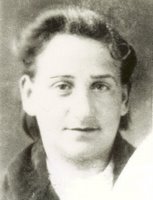 Mum and I had always wanted to go to her hometown Lodz together, but alas, she became ill, and it was not to be. So, along with all my personal baggage, this was an homage to my late mum, who kept a detailed and very moving memoir of her childhood years, which were spent in Lodz. I had never been to her part of the world where she spent her childhood whereas my kids know every inch of Toronto and how I lived my life as a kid. So I had a big empty spot that badly needed to be filled.
Mum and I had always wanted to go to her hometown Lodz together, but alas, she became ill, and it was not to be. So, along with all my personal baggage, this was an homage to my late mum, who kept a detailed and very moving memoir of her childhood years, which were spent in Lodz. I had never been to her part of the world where she spent her childhood whereas my kids know every inch of Toronto and how I lived my life as a kid. So I had a big empty spot that badly needed to be filled.We visited every one of my mother's homes up until December, 1939, when Mum went to Siberia with her brother. I would say that the second generation of us Lodzers are somewhat fortunate in that most of the city has been preserved just as it always has been. In fact, some of the original restaurants and places of business are still operational. It's almost like I was walking in her world.
 We stayed at the Grand Hotel on Piotrkowska Street, which still has an air of its former grandeur -- my mother's aunt who visited from Berlin used to go there to use the toilet since there was no indoor plumbing in my mother's family's apartment in Baluty. The marble interior and the restaurant have been preserved as have many of the brass signs and woodwork. With the exception of my mother, who was born in Lodz (Dad was from Konskie), everyone was wiped out
We stayed at the Grand Hotel on Piotrkowska Street, which still has an air of its former grandeur -- my mother's aunt who visited from Berlin used to go there to use the toilet since there was no indoor plumbing in my mother's family's apartment in Baluty. The marble interior and the restaurant have been preserved as have many of the brass signs and woodwork. With the exception of my mother, who was born in Lodz (Dad was from Konskie), everyone was wiped out 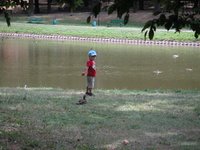 and so I had no connection to any of them other than through my mother's stories and her written memoirs. Now I was able to run my hand along the same marble handrail that was used by her aunt, and see the cinemas that Mum frequented, sample her favourite ice cream, see the bandshell at Park Helenow where the Chor Dana once performed, and even walk around the same lake that she remembered so fondly at the park. Its paddle boats are long gone, and Chor Dana is silent, but what an indescribable feeling to walk where Mum walked as a young girl.
and so I had no connection to any of them other than through my mother's stories and her written memoirs. Now I was able to run my hand along the same marble handrail that was used by her aunt, and see the cinemas that Mum frequented, sample her favourite ice cream, see the bandshell at Park Helenow where the Chor Dana once performed, and even walk around the same lake that she remembered so fondly at the park. Its paddle boats are long gone, and Chor Dana is silent, but what an indescribable feeling to walk where Mum walked as a young girl.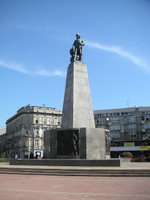
We walked to Plac Wolnoci and headed toward the old Jewish area of Baluty. There's a "new" statue (erected 1960) of Tadeusz Kosciusko to replace the one that was destroyed by the Nazis in 1939, as described by my mother: She chillingly recalled a Nazi soldier posing for a picture on that very site, laughing, arm around his girl, his jackbooted foot on the dynamited statue's head.
I was able to see and photograph all of my mother's homes from her
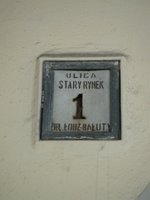 childhood, including Stary Rynek 1, which overlooks the once-crowded, lively marketplace. Mum was born into an attic apartment overlooking the square.
childhood, including Stary Rynek 1, which overlooks the once-crowded, lively marketplace. Mum was born into an attic apartment overlooking the square.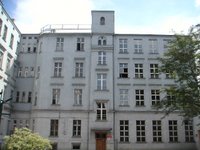
We saw her old school on Wierzbowa Street, and storefronts that she had described, such as the deli at Stary Rynek 1, which is now a souvenier and folk art store. We bought a keychain for Yona there and kept the receipt as a souvenier.
Despite the graffiti and neglect, it felt really good to come to
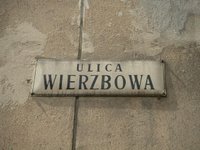 Lodz and "reclaim" it for my family as the origin of our family's history. Based on my mother's colourful description of the city streets, it seems that Lodz is empty and lonely for a more innocent time. Our visit was appreciated by the local businesses and the hotel. I felt very uplifted as I wandered around the old neighbourhood -- as though the dear departed souls knew that we had not forgotten them.
Lodz and "reclaim" it for my family as the origin of our family's history. Based on my mother's colourful description of the city streets, it seems that Lodz is empty and lonely for a more innocent time. Our visit was appreciated by the local businesses and the hotel. I felt very uplifted as I wandered around the old neighbourhood -- as though the dear departed souls knew that we had not forgotten them.I soon learned that the state of neglect is so
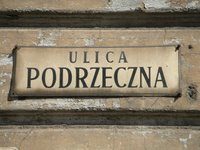 mething that is a holdover from the Communist era, which can be felt throughout Poland, and particularly in the poorer metropolitan areas such as Lodz. Buildings are dingy and run down (some are abandoned), streetcars are outdated and thunder through the
mething that is a holdover from the Communist era, which can be felt throughout Poland, and particularly in the poorer metropolitan areas such as Lodz. Buildings are dingy and run down (some are abandoned), streetcars are outdated and thunder through the 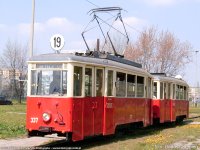 streets with no shock absorbers. They are known to run off the tracks and tip over. If you're driving, get out of the way when you hear them. They are not real clear on right of way at intersections either.
streets with no shock absorbers. They are known to run off the tracks and tip over. If you're driving, get out of the way when you hear them. They are not real clear on right of way at intersections either.After a good bit of walking, we found what was left of J
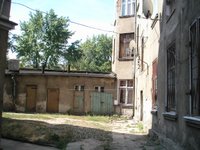 akuba Street, which is where my mother was placed by the Jewish komitat when she came back to Lodz. It was the best they could offer. The remnant is a row of tenement cabins behind some more recent buildings. It seems that today they serve as worksheds. That was the worst to see, and to imagine that, after surviving six years in Siberia and the decimation of her entire family, this was her hero's welcome.
akuba Street, which is where my mother was placed by the Jewish komitat when she came back to Lodz. It was the best they could offer. The remnant is a row of tenement cabins behind some more recent buildings. It seems that today they serve as worksheds. That was the worst to see, and to imagine that, after surviving six years in Siberia and the decimation of her entire family, this was her hero's welcome.The local Jewish community, headed by Hazzan Symcha Keller
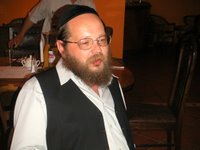 , was welcoming and warm. The community is housed in the original Jewish community building which dates back to 1840 and can be found at the gmina at 18 Pomorska Street.
, was welcoming and warm. The community is housed in the original Jewish community building which dates back to 1840 and can be found at the gmina at 18 Pomorska Street.Coincidentally we arrived in Lodz on Tisha B'Av -- a day of mourning on the Jewish calendar which commemorates destruction of two temples as well as Krystalnacht. We were invited to have dinner with the community members before nightfall, and then we went to prayers in the gmina synagogue that night. Services were led by Symcha, who chanted a haunting Lodzer melody of Eichah (Lamentations) that he learned from an elderly hasidic cantor who had remained in Lodz, now deceased.
I'm sure some of you know that Symcha and his staff are a great resource for finding Jewish geneological records.
During the course of that day I learned that the city of Lodz would be hosting a group of children from the northern Israeli town of Nahariya who were coming to get some relief from their shell-shocked city. I contacted the Jewish Telegraphic Agency and fed them the story. I posted it here with the blessing of the JTA.
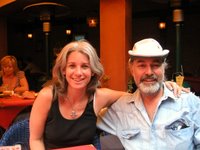 The rest of our stay was spent talking with people and getting a feel for the city and the country. We were hosted by friends -- she is Lodz-born and bred married to a Canadian. They returned to Lodz together this year to take care of her elderly mother who never left the city except for imprisonment in Auschwitz. She has been slowing down, and when her annual trip to Toronto became too difficult for her to manage, the couple decided to pack up and come to Lodz to take care of her. I had the very rare opportunity to spend time with her and get to hear about what life was like from someone who never left.
The rest of our stay was spent talking with people and getting a feel for the city and the country. We were hosted by friends -- she is Lodz-born and bred married to a Canadian. They returned to Lodz together this year to take care of her elderly mother who never left the city except for imprisonment in Auschwitz. She has been slowing down, and when her annual trip to Toronto became too difficult for her to manage, the couple decided to pack up and come to Lodz to take care of her. I had the very rare opportunity to spend time with her and get to hear about what life was like from someone who never left.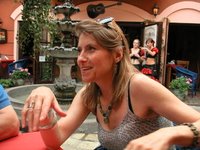
Overall, it was a good feeling to "come home" to Lodz and get to know and understand the city and its people. It is a complicated place which on one hand has preserved the Jewish ghetto area for its occasional interested groups and meanderers like me.
On the other hand, it boasts the Manufaktura, a huge, world-class shopping mall in the old textile mill area. It was there that "Di Kinder Fun Lodzer Ghetto / Dzieci z lodzkiego getta," a moving musical commemoration of the
 60th anniversary of the ghetto by Andrzej Krauze, was recorded. I was also impressed to hear that Lodz Mayor Jerzy Kropiwnicki is an outspoken advocate on behalf of Jewish causes and a good friend of the Jewish community. Even better -- he is popular with the electorate.
60th anniversary of the ghetto by Andrzej Krauze, was recorded. I was also impressed to hear that Lodz Mayor Jerzy Kropiwnicki is an outspoken advocate on behalf of Jewish causes and a good friend of the Jewish community. Even better -- he is popular with the electorate.My advice to anyone of Polish origin -- whether Jewish, Roma, Catholic or otherwise -- is to visit Poland if you've never been there. It is full of history -- some of it your own. You will learn a lot about yourself in the process. And to boot -- by western standards it's a very inexpensive holiday that will not break your bank book.
A few tips when reclaiming Lodz:
Eat!! Polish food of the farmers is delicious and familiar! It is a cornucopia of grains, dairy and meat products (and veggies such as cabbage, potatoes, pickles plus fresh seasonal fruits and veggies) perfect for cold weather eating. Rye bread is a must! Younger Jewish Americans will recognize many of the dishes as fairly typical of their grandparents' fare.
For a taste of the aristocracy, have coffee and dessert at the Klub Spadkobiercow upstairs at Piotrkowska 77. It has been a fine dining establishment since the end of the 19th century and its decor has been impeccably preserved. Ask the management about the history of this restaurant, which emerged as part of the industrial age in Lodz. You will not be disappointed. Your Eastern European ancestors probably dined here, perhaps during a business trip while staying across the street at the Grand Hotel.
When you are absolutely tired of paying dirt-cheap prices in the mom and pop shops along the main drag, then you are
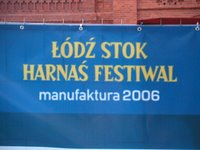 ready to come to the brand-spanking new Manufaktura to browse the stores, watch the people and feel what it's like to wander around in a expansive indoor shopping mall on the site of the historic textile mills of Lodz. There is also a museum on premises. Don't be surprised at this time of year if you hear live music from a big stage near the children's rides and amusement area where you will notice signs that advertise "Lodz Stok" -- the Polish pronunciation is Woodge-stock...like Woodstock...get it?
ready to come to the brand-spanking new Manufaktura to browse the stores, watch the people and feel what it's like to wander around in a expansive indoor shopping mall on the site of the historic textile mills of Lodz. There is also a museum on premises. Don't be surprised at this time of year if you hear live music from a big stage near the children's rides and amusement area where you will notice signs that advertise "Lodz Stok" -- the Polish pronunciation is Woodge-stock...like Woodstock...get it?If you are Jewish, or suspect that you may have Jewish relatives that no one told you about, then give props to the old Jewish community of Lodz, check out the numerous museums and visit the old cemeteries. You might want to read this article from 2000, in which a university professor comes to Lodz and expresses the overwhelming sentiments along his road to reconciliation. And then you can come by the Jewish gmina at 18 Pomorska Street and join the local community for Shabbat, or just come say hello at the kosher Cafe Tuwim, also located at the 18 Pomorska Street complex.
No comments:
Post a Comment